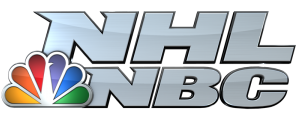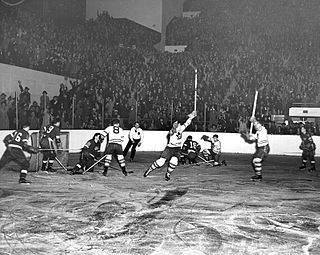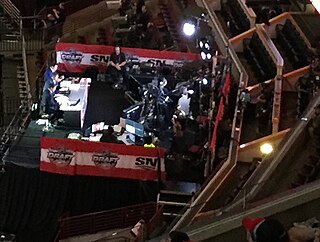
The National Hockey League is a professional ice hockey league in North America comprising 32 teams—25 in the United States and 7 in Canada. It is considered to be the top ranked professional ice hockey league in the world, and is one of the four major professional sports leagues in the United States and Canada. The Stanley Cup, the oldest professional sports trophy in North America, is awarded annually to the league playoff champion at the end of each season. The NHL is the fifth-wealthiest professional sport league in the world by revenue, after the National Football League (NFL), Major League Baseball (MLB), the National Basketball Association (NBA), and the English Premier League (EPL).
As with most other professional sports, ice hockey is broadcast both on radio and television.
Brian McFarlane is a Canadian television sportscaster and author. He is also the Honorary President of the Society for International Hockey Research. He is the son of writer Leslie McFarlane. He is best known as a broadcaster on Hockey Night In Canada and as an author of hockey books.
The 1952–53 NHL season was the 36th season of the National Hockey League. The Montreal Canadiens were the Stanley Cup winners as they beat the Boston Bruins four games to one in the final series.

The NHL on NBC is an American presentation of National Hockey League (NHL) games produced by NBC Sports, and televised on NBC properties, including MSNBC, CNBC, Golf Channel, USA Network and NBCSN in the United States.

The history of the National Hockey League begins with the end of its predecessor league, the National Hockey Association (NHA), in 1917. After unsuccessfully attempting to resolve disputes with Eddie Livingstone, owner of the Toronto Blueshirts, executives of the three other NHA franchises suspended the NHA, and formed the National Hockey League (NHL), replacing the Livingstone team with a temporary team in Toronto, the Arenas. The NHL's first quarter-century saw the league compete against two rival major leagues—the Pacific Coast Hockey Association and Western Canada Hockey League—for players and the Stanley Cup. The NHL first expanded into the United States in 1924 with the founding of the Boston Bruins, and by 1926 consisted of ten teams in Ontario, Quebec, the Great Lakes region, and the Northeastern United States. At the same time, the NHL emerged as the only major league and the sole competitor for the Stanley Cup; in 1947, the NHL completed a deal with the Stanley Cup trustees to gain full control of the Cup. The NHL's footprint spread across Canada as Foster Hewitt's radio broadcasts were heard coast-to-coast starting in 1933.
NHL on CTV is the name of a former television program that broadcast National Hockey League games on the CTV Television Network.

The Original Six era of the National Hockey League (NHL) began in 1942 with the demise of the Brooklyn Americans, reducing the league to six teams: Boston Bruins, Chicago Black Hawks, Detroit Red Wings, Montreal Canadiens, New York Rangers, and Toronto Maple Leafs. This structure remained stable for a quarter century; the era ended in 1967 when the NHL doubled in size adding six expansion teams.
The National Hockey League has never fared as well on American television in comparison to the National Basketball Association, Major League Baseball, or the National Football League, although that has begun to change, with NBC's broadcasts of the final games of the 2009, 2010, 2011, and 2013 Stanley Cup Finals scoring some of the best ratings ever enjoyed by the sport on American television.
The National Hockey League (NHL), a professional ice hockey league active in the United States and Canada, is broadcast over the radio mainly in its participating countries.

The 2011 NHL Winter Classic was an outdoor ice hockey game played in the National Hockey League (NHL) on January 1, 2011, at Heinz Field in Pittsburgh, Pennsylvania. The fourth edition of the Winter Classic, it matched the Washington Capitals against the Pittsburgh Penguins; the Capitals won, 3–1. The game, rescheduled from its original 1:00 p.m. ET start time to 8:00 p.m. due to weather concerns, was telecast on NBC in the United States, and CBC (English) and RDS (French) in Canada. Pittsburgh native Jackie Evancho performed the Star Spangled Banner and Pittsburgh sports legends Mario Lemieux, Franco Harris and Jerome Bettis presided over the ceremonial dropping of the puck, and during the second intermission Harris and Bettis hosted a fan event at the outside rink.

The 2014 NHL Winter Classic was an outdoor ice hockey game played in the National Hockey League (NHL) on January 1, 2014, at Michigan Stadium in Ann Arbor, Michigan. The sixth edition of the Winter Classic, it matched the Toronto Maple Leafs against the Detroit Red Wings; the Maple Leafs defeated the Red Wings, 3–2, in a shootout to move past the Red Wings in the Atlantic Division. The game was televised nationally in Canada on CBC and nationally in the United States on NBC. The game set an NHL attendance record of 105,491, surpassing the previous record set during the 2008 NHL Winter Classic.
From 1965 through 1975, in addition to the Saturday night game on CBC, Hockey Night in Canada also produced and broadcast a Wednesday night game on CTV, CBC's privately owned competitor; beginning in the 1975–76 NHL season, these midweek games would begin to be broadcast by local stations.
From 1965 through 1975, in addition to the Saturday night game on CBC, Hockey Night in Canada also produced and broadcast a Wednesday night game on CTV, CBC's privately owned competitor; beginning in the 1975–76 NHL season, these midweek games would begin to be broadcast by local stations. In 1970–71, the Vancouver Canucks joined the NHL, meaning that there were now three possible venues for an HNIC telecast.
Since 2000, the CBC has aired an annual special Hockey Day in Canada broadcast to celebrate the game in Canada. The broadcast includes hockey-related features all afternoon, leading up to a tripleheader of NHL action featuring the seven Canadian teams. One exception was the 2008 edition that featured four games including two American teams along with the six Canadian teams; this was due to the NHL's schedule format at the time, as there was no inter-conference games between Canadian teams. Lead commentators, Don Cherry and Ron MacLean broadcast from a remote area. The broadcast includes live broadcast segments from smaller communities right across the country and features panel discussions on issues facing "Canada's game" at both the minor and pro levels. The day is usually in mid-February, but was broadcast in early January in 2002 and 2006 due to the 2002 Winter Olympics and 2006 Winter Olympics, respectively; the 2007 event was also held in January, though no sporting events key to Canada were scheduled.

On April 19, 2011, after ESPN, Turner Sports, and Fox Sports placed bids, NBC Sports announced it had reached a ten-year extension to its U.S. television contract with the NHL worth nearly $2 billion over the tenure of the contract. The contract would cover games on both NBC and sister cable channel Versus, which became part of the NBC Sports family as the result of Versus parent Comcast's controlling purchase of NBC Universal earlier in 2011.
The National Hockey League (NHL) is shown on national television in the United States and Canada. With 25 teams in the U.S. and 7 in Canada, the NHL is the only one of the four major professional sports leagues in the United States and Canada that maintains separate national broadcasters in each country, each producing separate telecasts of a slate of regular season games, playoff games, and the Stanley Cup Finals.







